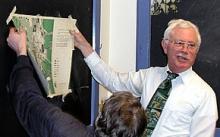Professor Emeritus Richard L. Morrill passed away on Thursday, March 28, 2024. He had been ill for several years and passed away with his wife and best friend at his bedside.
Dick was born in Los Angeles, California, in 1935. He received his B.A. in Geography from Dartmouth College in 1955. He moved to the University of Washington in Seattle that year to pursue a Master’s degree under Edward Ullman. Ullman was about to undertake fieldwork in Italy, however, so he moved to work with William Garrison, who was a pioneer in statistical methods and analysis. Dick and his cohort became known as the “Space Cadets.” During the Quantitative Revolution, Dick was part of a group of geographers who sought to transform the discipline from an idiographic regional tradition to a modern, mature spatial science.
After receiving his Ph.D. from University of Washington in 1959 (completing a dissertation on the effects of the U.S interstate highway system on the use of medical services), he became an assistant professor of geography at Northwestern University. In 1961 he became a post-doctoral researcher at the University of Lund, Sweden. Later that year he returned to the University of Washington as an assistant professor. He would spend the rest of his career in Seattle, retiring in 1997. He was a founder of the Institute of Environmental Studies at UW and the first director of the Ph.D. program in Urban Design and Planning. He held appointments in Health Sciences, the Center for Demography and Ecology, and the Graduate School of Public Affairs.
Across his vast career, Dick published eight monographs, over 80 journal articles, as well as fifty-four chapters in books and proceedings. His books include The Geography of Poverty in the United States (1971), The Spatial Organization of Society (1972), and Political Redistricting and Geographic Theory (1981). He received eight NSF grants, a Guggenheim fellowship (1983-1984), and the University of Washington Distinguished Retiree Excellence in Community Service Award in 2014, amongst many other awards and recognition.
Dick chaired the UW Department of Geography from 1973 to 1983. He was president of the Western Regional Science Association from 1992 to 1994. He served as American Association of Geographers (AAG) President in 1983. His presidential address, “The Responsibility of Geography,” was published in the Annals of the AAG in 1984, volume 74, issue 1.
Dick’s interests were wide ranging. He was an economic geographer interested in location theory, transportation, regional planning and development. He was a socio-political geographer interested in inequality, segregation, health services, redistricting and local government reform. He was an urban geographer interested in population and migration, growth management, and regional planning. He was a methodologist interested in quantitative and spatial analysis, location and movement models. Finally, Dick was a geographer with regional expertise in the United States, the Pacific Northwest, and the Seattle metropolitan area. He taught in all these areas. He supervised 22 M.A. students and 30 Ph.D. students.
He was appointed as Special Master to the Federal District Court in Seattle to redraw Washington state legislative and congressional electoral districts in 1972. This led to work in major Supreme Court cases on political gerrymandering, and with the U.S. Justice Department on redistricting in Mississippi. Other professional service included serving on the Hanford Environmental Dose Reconstruction Project (1986-1996), drawing maps for the Seattle School District to desegregate schools (1987-1989), conducting a Branch Campus Demographic Analysis for the State of Washington (1988-1989), and drawing proposed City Council districts for a (successful) ballot initiative to shift the City of Seattle from an all at-large Council to a mostly district-based one (2012-2013). He did numerous demographic and spatial analyses including issues of Native fishing rights (the Boldt decision), and the gentrification and African-American displacement of Seattle’s Central District neighborhood.
Dick always melded his political activism with his teaching and scholarship. Besides teaching Garrison’s GEOG 426 Advanced Quantitative Methods, Dick created GEOG 342 Geography of Inequality (both of which are still on the books in the department!).
Dick was a member of Students for a Democratic Society, and the UW Student Peace Union. He refused to sign the anti-Communist loyalty oath at UW in the early 1960s, and was part of a court case to abolish it. He was the first single man in Washington to be allowed to adopt a child. He worked over three years with the Congress of Racial Equality (CORE) from 1960 to 1964 doing research, legal, and street action. His chapter of CORE chartered a bus to the Student Non-Violent Coordinating Committee (SNCC) for the 1964 March on Washington. He worked with the American Friends Service Committee on peace issues and reform of mental institutions. He was also a member of the North Cascades Conservation council.
Amidst all this, Dick was a kind, compassionate, caring, and upbeat person. In a 1998 talk he referred to himself as a “uncurable idealist.” He is survived by his wife Joanne, and his children Lee (Danielle), Andrew, and Jean (Dave).
The family plans some sort of service or event in late spring or early summer, but we have no details about arrangements at this time.
Visit this interview with Richard L. Morrill for the series Geographers on Film (1971):
